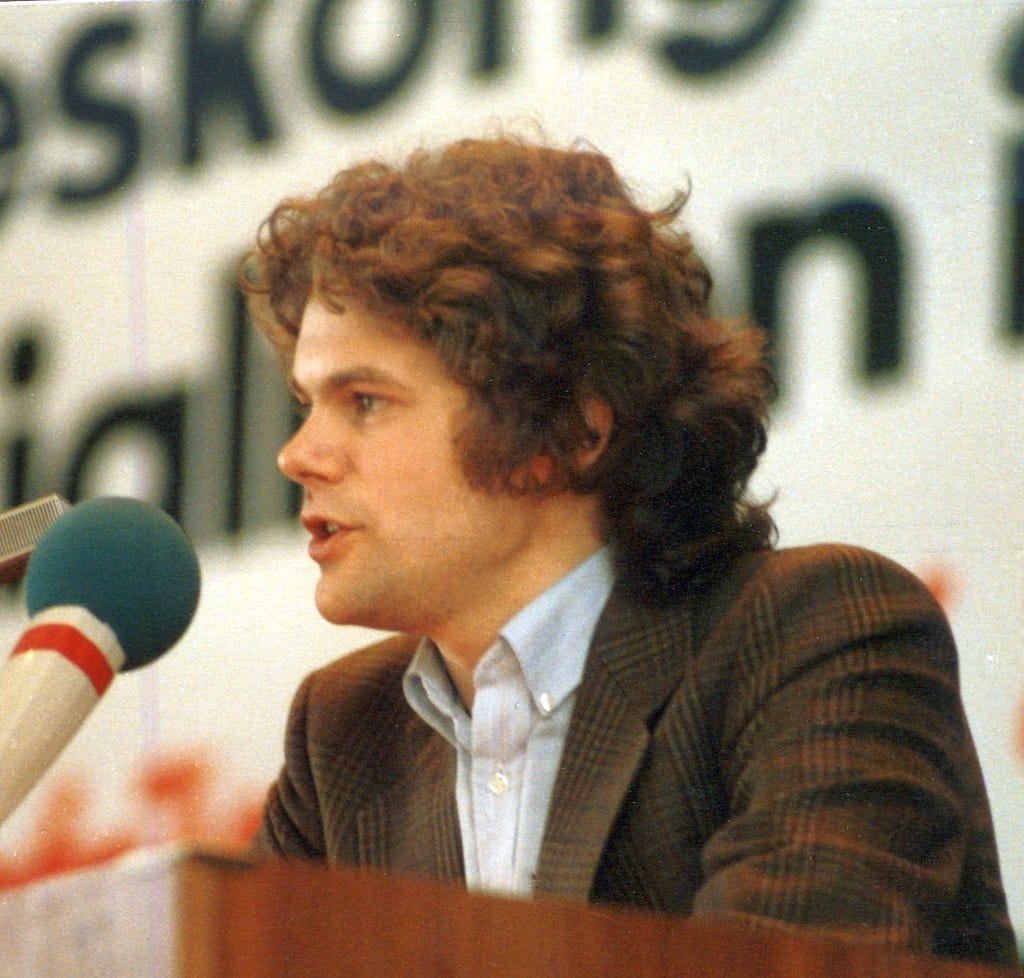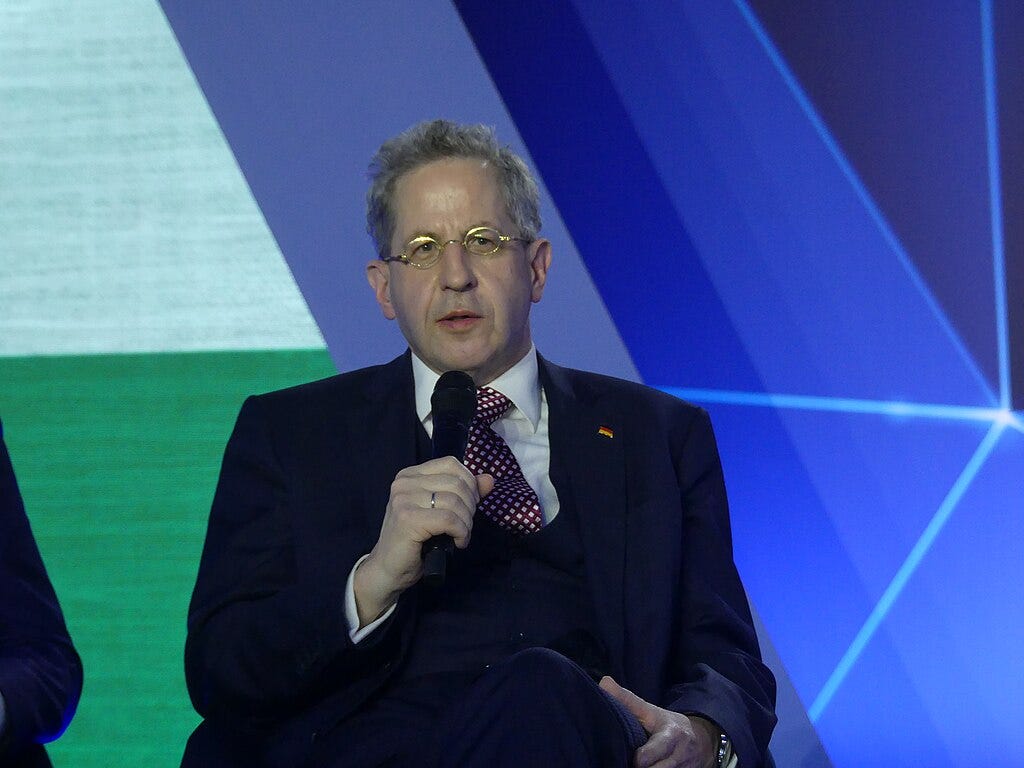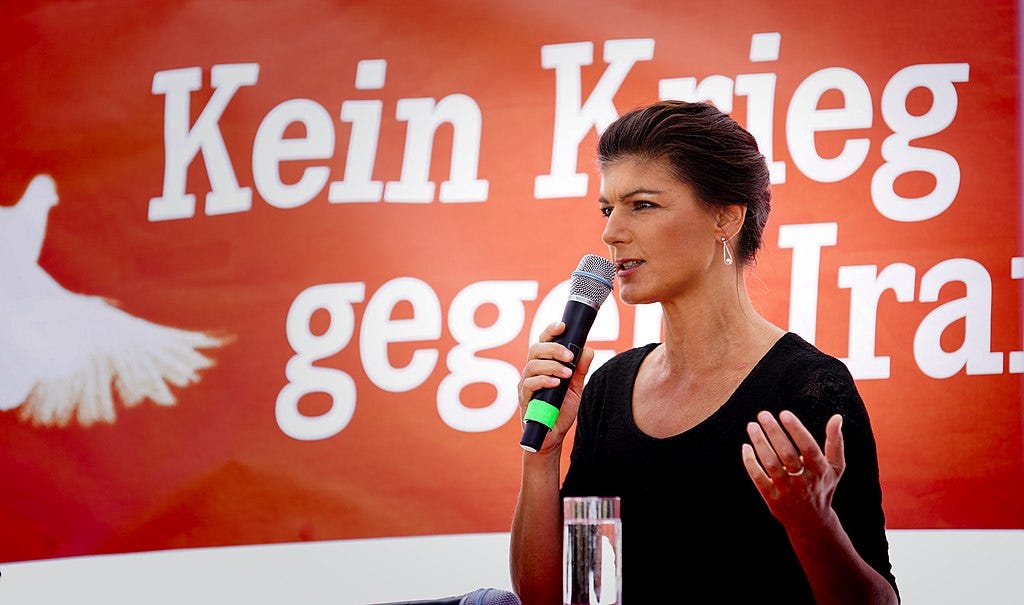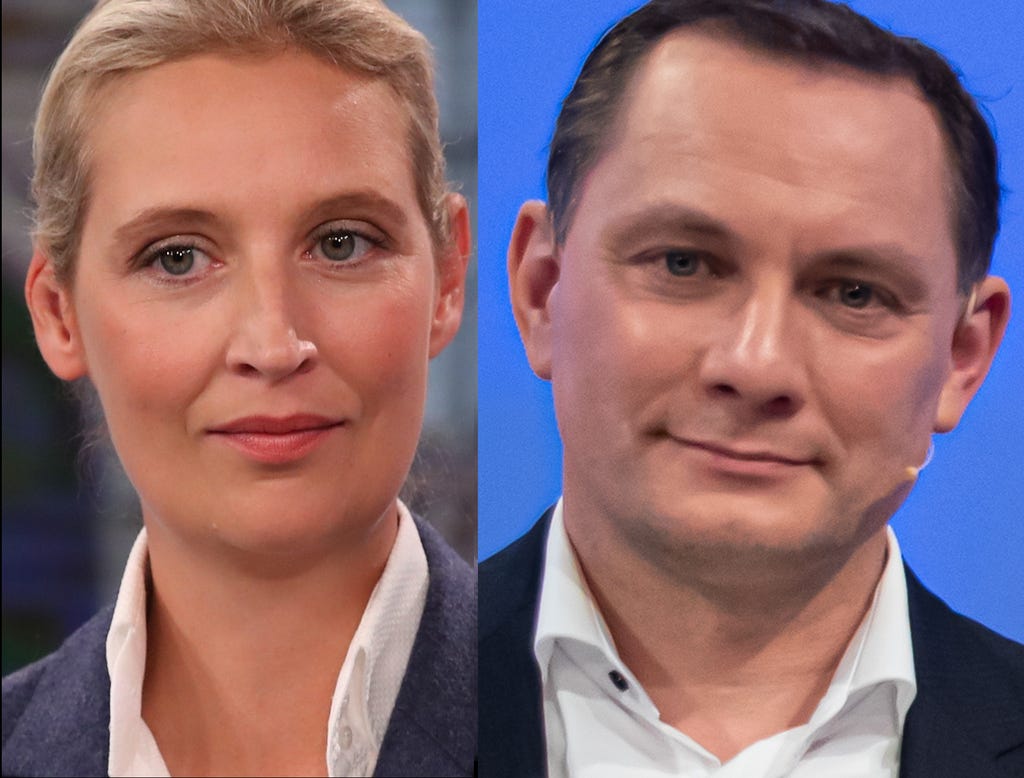A Test of Democracy: Will Germany Really Start Banning Opposition Parties?
Alongside the AfD, there are several new movements in Germany challenging the traditional parties in power.
Germans' dissatisfaction with the current economic situation and the way the state is being run is allowing parties and movements that are new to the country's traditional political landscape, often accused of populism or even extremism, to emerge and grow in popularity. Can a ban on popular opposition parties, as discussed by politicians in power, really be an option in Germany?
The Social Democratic Party, SPD (Sozialdemokratische Partei Deutschlands), is the party with the longest history in Germany. Alongside the CDU/CSU, they have been referred to as the 'people's parties' ('Volkspartei'). The CDU/CSU (Christlich Demokratische Union Deutschlands/Christlich-Soziale Union in Bayern) is usually referred to as the "Union", and its constitution describes it as a Christian democratic, conservative and economically liberal party. The third old party, the Free Democratic Party, FDP (Freie Demokratische Partei), the classical liberals, is just as old and has often been the driving force behind the formation of coalition governments. In 1979/80 the Alliance 90/Green Party (Bündnis 90/Die Grünen) was founded, rooted in protests against nuclear power and, of course, weapons, peace marches, and concern for nature. Waldsterben, the dying of the forest because of polluted air is a word that they have coined and has later been adopted by other languages, much like Butterbrot and Kindergarten. Whether or not air pollution causes forest dieback is no longer clear today. The Greens, however, with their basic objectives, have stayed and are currently governing the country in a coalition with the Socialists and the FDP. This is called the 'traffic light coalition', after the colours that symbolise the parties. Fortunately, since the start of the full-scale war in Ukraine, the Greens have abandoned pacifism, and the party's leading politicians, Foreign Minister Annalena Baerbock and Economics and Climate Minister Robert Habeck are more staunchly supportive of Ukraine than the Socialist Chancellor Olaf Scholz, who in his youth belonged to very left-wing groups and was very keen on Russia, working with the communist youth organisations of East Germany. Who knows how much has his thinking changed since then?

Franz-Josef Strauss, the long-time leader of the Bavarian sister party of the CSU/CDU (he was chairman of the CSU from 1961 until his death in 1988), once said that there could be no political party to the right of the CSU. In Strauss's time, the CSU was seriously conservative, while the Alternative for Germany, or AfD (Alternative für Deutschland), emerged as an alternative to Merkel's policies.
In 2005 Angela Merkel came in and stayed until 2021. Books are still being written about what went wrong under her rule. Former US ambassador to Germany, Richard Grenell, gave an interview to the Frankfurter Allgemeine Zeitung on February 25 in which he called Angela Merkel a co-conspirator in the war in Ukraine. Merkel's three biggest mistakes, according to the envoy, were the continuation of the construction of Nord Stream II when many countries were already warning Germany against Vladimir Putin. Germany's refusal to raise its defence spending to the promised 2% and its unwillingness to impose new sanctions on Iran. If Germany had changed its policy towards Russia, there would be no war in Ukraine today, nor in Gaza, said Grenell. We recall that there has been a lot of talk in the press lately about how dangerous former US President Donald Trump is, acclaimedly wanting to disband NATO, when in fact he is talking about funding commitments from member states.
Merkel's 'liberal' legacy
The CDU/CSU is now headed by Friedrich Merz, who at the time gave up the party because he clashed with Merkel. Or perhaps Merkel made it impossible for him to continue.
But the CDU/CSU after 16 years of Merkel is something different than before. On some important points, the party's programme is still adhered to - for example, in criticism of not keeping nuclear power plants in operation to supposedly save the climate, even though in other countries nuclear energy is included in renewable energy. Mr Merz makes fiery speeches in parliament about how the Greens have led the German economy into a recession from which there is no prospect of returning under current policies. The reason is the same as it is in other countries that are trying to move to Net Zero and therefore implement the so-called 'green policies'.
According to current polls, the CDU/CSU is consistently the most popular party among German voters, with 30-32% of the population supporting it. One can believe that if the CDU/CSU were to come to power, it would put the brakes on the 'green turnaround' and roll back some of the laws that are strangling the economy.
Last summer, Merz appointed a younger man, Carsten Linnemann, as the party's secretary-general, tasked with developing a new programme for the party. It will be adopted at the party congress in May, and discussions on the new programme have already started within the party. The first debate was in Mainz and another one last weekend in Cologne. The CDU is a large party, with 1400 members attending the debate in Cologne. They were greeted by an Antifa demonstration in front of the building and by reporters filming those entering, from the other side of the street. So far it has been said and written that it is important for the CDU to restore the German Leitkultur – or 'dominant German culture' – and to take asylum seekers to third countries until a decision is taken to grant them political asylum. In the current two debates, however, every word and thought that could upset the left-liberal public has been scrupulously avoided. Carsten Linnemann dared to highlight the Christian worldview of the CDU, and Friedrich Merz reiterated freedom and security in his speech. Whether the freedom of the citizen and the state is also threatened by something within the state, or only by an external enemy, was not mentioned. Of course, Mr Merz and every other speaker spoke about the economy, promising to improve it radically, while not saying by which measures. Whether clearer and bolder plans will be on the table in May remains to be seen.
That Merz is taking account of how liberal the party has become under Merkel can also be seen from the CDU's handling of Hans-Gerog Maassen. A draft had already been prepared for his expulsion from the party (the SPD has not expelled Gerhard Schröder, who is still linked to Gazprom and justifies Putin) when he resigned himself.
Germany's secret police suspect its ex-leader of "right-wing extremism"
Hans-Georg Maassen belonged to a group within the CDU called Werteunion, the Values Union, which was formed in 2017. It aimed to preserve the CDU/CSU's traditional conservative values, which were, however, a bait to those who had veered politically to the left during the Merkel years. From 2012 to 2018, Maassen was President of the Bundesamt für Verfassungsschutz (Federal Office for the Protection of the Constitution), the country’s domestic intelligence agency. It would perhaps be too time-consuming to explain all the details of what he was accused of doing, namely what he thought and said about an incident of violence in Chemnitz, where a German demonstrator was killed and where alleged far-right extremists had subsequently hunted down foreigners. Since then, Maassen has not been appointed to any higher state office, and he has probably aspired to one himself. He has been outspoken in presenting conservative views but kept it in line with the CDU/CSU programme. In January it became known – it was reported on the evening news, so is not a conspiracy theory – that the same constitutional watchdog, the intelligence agency, was monitoring Maassen, suspecting him of 'right-wing extremism'.

On 17 February, Maassen announced that he and his associates had taken with them the name of the Values Union and founded a new party. They have not announced that they would intend to joint action with the AfD, but have not ruled it out, which gives the press a reason to speak in no uncertain terms of a far-right group.
In the first month of the year, another new party was formed, which had long been awaited. Sahra Wagenknecht resigned from the far-left party, The Left (Die Linke), to form a party called Bündnis Sahra Wagenknecht (BSW).
Sahra Wagenknecht's party is already supported by 9% of the electorate, according to polls, because Wagenknecht is a well-known and popular figure in German politics. She is married to Oskar Lafontaine, a former Social Democrat candidate for chancellorship and a senior politician. Sahra Wagenknecht speaks out on many issues, such as social stratification, but especially immigration, in an open text that has won her the sympathy of potential voters. In the last two years, she has stood out for calling for an end to the war in Ukraine, that is to say, for the West to stop giving Ukraine weapons, for the Ukrainians to stop defending their country, and to force them unto a negotiating table with Putin. These positions are not unpopular in Germany, quite the contrary. The AfD, on the other hand, might favor Putin more than some others, but in times of war, they no longer speak loudly about it. In the past, indeed, several AfD politicians have praised Russia and its leader. But that is nothing exceptional in Germany.

The cherry on the cake against this backdrop is the plan to set up a Turkish party in Germany, perhaps even a sister party to Erdogan's party. It will be interesting, and to a certain extent instructive, to see whether this can be prevented.
Germany's domestic politics are this year focused on the three East German Länder, the states, where elections will be held in the autumn. Let us recall that Germany is a federal state and that local Länder have great power. In Saxony, Thuringia, and Brandenburg, more than 30% of voters support the AfD. The BSW gets more votes than The Left and the CDU/CSU is somewhere around 20%. If all goes as currently expected, the AfD will win the election, the CDU will come in second and the BSW could come third.
Do Germans consider the AfD to be far-right?
How is AfD as the main opposition party perceived by Germans? Although their political opponents call them far right, I can give you an example of a click poll on the internet platform gmx.net that shows how ordinary Germans think otherwise. GMX is one of Germany's large and popular Internet platforms that offers a free e-mail address. To log in, one must and can read their news. Sports, politics, and entertainment, in quality no worse or better than most of the others. Compared to the mainstream, in any case. Quite often people are asked there for their opinion on one thing or another. Recently people were asked whether they consider the AfD to be a far-right party. 70% of the respondents - I can't remember the exact number of them, but it was big, in thousands, since gmx is a platform with a wide reach – said no. Then there were those in between who couldn't take a side and about 20% who thought that the claim that AfD is 'far-right' was true.

To get the AfD out of the game, representatives of the big parties, especially the socialists, are discussing banning them. Germany is still a democracy and a state governed by the rule of law – the laws and decisions of the Covid era are now being debated quite thoroughly in courts and the state is far from always winning the battles. A constitutional basis should be found for banning a party. The AfD has won most of the lawsuits against its politicians. There are many lawyers in AfD and they know that they have to adhere to the letter of the law even more strictly than the old parties. However, it is widely debated whether the government will try to ban the AfD. I very much hope not. The Germans would not accept this and of course, the German Government also knows this. Out of fear of the AfD, and now also of the Values Union, there is an urgent attempt to pass the Demokratieförderungsgesetz - Democracy Promotion Act, which is criticised even by the coalition partner FDP. Now, however, I suppose it has to be said – 'there was an attempt'. The Bundestag's Scientific Service (Wissenschaftliches Dienst) has examined the bill and has concluded that it does not comply with the German constitution. There are several objections to this, the most important of which is that the constitution provides for the political education of young people, but not of adults. The bill is, or was, backed by Interior Minister Nancy Faeser (SPD) and Family Minister Lisa Paus (Greens). On the one hand, the law must/should prohibit, prevent, and punish anything that does not conform to the 'liberal agenda'. On the other hand, the state was going to fund these organisations, NGOs, which were going to educate and re-educate the people in the right direction. They would have found the funding for that despite the fact that the economic situation in Germany is terrible.
Perhaps the reader will have noticed that there have been large demonstrations against the 'far-right' in German cities recently. This is the work of the Correctiv platform, which in January, to the sound of a drumbeat, published a news item entitled 'Geheimplan gegen Deutschland' – 'A secret plan against Germany'. The news item told how a 'secret meeting' had taken place in Potsdam, attended not only by AfD but also CDU politicians who had allegedly discussed 'remigration'. In other words, the expulsion of German citizens who have acquired German citizenship by naturalisation to their country of origin. Several legal proceedings have now been launched against the authors of the 'news'. From whom and where did this information come from? It is also absurd that anyone could have such a plan. In Germany, there are hundreds of thousands of people whose asylum applications have been rejected, but who have not been deported, and probably will not be deported, because that is simply not done there, even if the law requires it. Just to send them back would be a Herculean task. As far as I know, citizens of non-German origin make up a quarter of the German population. I can't imagine anyone trying to get rid of them. However, the Germans are used to marching for a good cause, for peace and against war and nuclear energy, for Palestine, etc. For several weekends, the liberal citizens of the big cities were able to happily take to the streets together again. Current political leaders, Chancellor Scholz and foreign minister Annalena Baerbock marched and patted themselves on the back – how bravely Germany is standing up to the right-wing threat.





